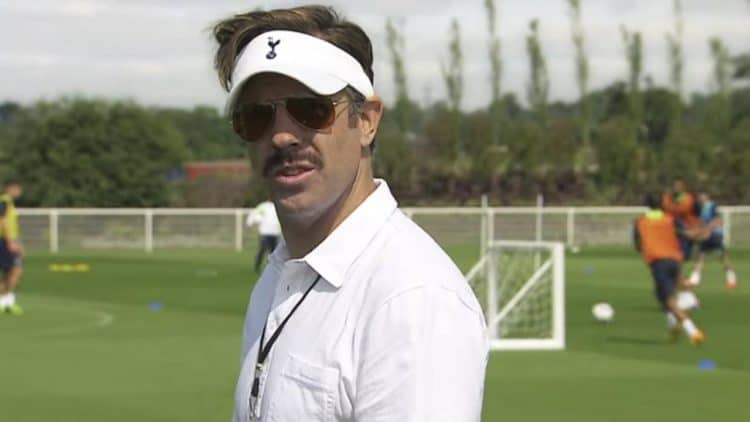
Much was made about a world without sports during the 2020 blackout. To sports fans from around the world, losing that sense of normalcy sports provided was a jarring gut punch. Watching strangers play a game and staking way too much whether or not they do so is an age-old passion that goes back to humanity’s earliest days, when the bloodlust that goes with the game itself was more literal than it is today, in theory.
Sports entertainment is a lucrative ode to masculinity. Rocky, Hoosiers, Remember the Titans, Rudy, even the recent Space Jam: A New Legacy run on the premise of men manning up to prove their manliness. The trash talk, the motivational speeches, the gruesome injuries, and the drive to win no matter the cost is presented as the end-all-be-all, whether Rocky Balboa loses to Apollo Creed or the Titans win the championship.
When a movie isn’t about a lost and forlorn man who overcomes the odds to win as a player or a coach, it’s about a woman who guides herself through a roster of forlorn men to succeed as a player or coach, or a forlorn man who hits rock bottom when he has to coach a girl’s basketball team after whatever fall from grace they had. None of this is wrong, necessarily. But it ignores the humanity away from wins and losses and often implies that success in sports is success in life. Apple’s Ted Lasso is not that case.
I was late for the Lasso train. After a year of hype, I wasn’t sure if it was going to be for me. I enjoyed Jason Sudeikis in his more minor roles but seldom gave his chops much thought. However, after everyone I knew banded together to make the show a massive hit, I finally took the plunge.
At first glance, I expected it to be a forgettable sports comedy from a b-list SNL alum that might fit in with Adam Sandler’s sports comedies. It wasn’t a fair read. Jason Sudeikis has always been a different type of actor. While he hardly gets the chance to show his chops, his penchant for playing lovable doofuses was different than Sandler’s three-decade run as a screaming lunatic with a heart of gold. I didn’t know what to read into it. Then, I heard Sudeikis say those magic words in the LA Times.
“The feeling at the end of the day of writing this guy or pretending to be this guy, it’s nice. He’s egoless,” Sudeikis said. “He’s Mr. Rogers meets John Wooden.”
John Wooden might not be a household name to those who don’t watch sports. However, anyone who follows basketball knows that he’s a beloved figure by everyone who played for him. Coaching everyone from Bill Walton to Kareem-Abdul Jabbar, Wooden’s three-decade run with UCLA coincided with the rise of the NBA and college sports as we know them. While many college coaches have a reputation as hard-asses, Wooden is one of the greatest motivators in sports history. Perhaps, this is why, in a world where retired athletes turn into old men yelling at the clouds, Walton and Jabbar are two of the patron saints of sports-based positivity that they learned, in part, from Wooden. By adding a little Fred Rogers to the mix, they found a man who anyone can get behind.
Ted Lasso is a comedy through and through, but it’s not the type of comedy one expects. The laughs don’t come from mean-spirited pranks and insults — a staple of sports comedy, office comedy, and comedy in general. While not entirely grounded in reality, many of the laughs come from the casual conversations between Lasso, his good-hearted attempts to interact with fans who christened him “The Wanker,” and occasional emotional outbursts at the most inopportune time.
Some of the show’s best moments are something out of an emotional drama movie. Lasso doesn’t need abundant laughs to work. Yes, he might be Mr. Rogers and John Wooden by Jason Sudeikis, but that doesn’t mean his life is easy. Lasso is a force of positivity, but he’s also a human being with a crumbling marriage, a son he’s trying to keep happy, and severe bouts of anxiety presented with more nuance than dramas that hinge on such outbursts.
One minute Lasso might be having biscuits with the boss, but that might lead to a poignant conversation about getting through life’s woes, looking at the glass half full, and how to make a terrible world just a little bit better. Lasso takes a genre that often focuses on the charming side of toxic masculinity and instead shows that a world like that can function without tearing others down, relying on athletic accolades for happiness, and living the entire year for one moment of glory with a trophy. Win or lose, Lasso takes the sentiments of a youth soccer coach and shows that grown men can also abide by them.
Nobody has to like the show’s portrayal of a not-so-toxic-positivity. The six people who dislike Ted Lasso tend to deride it for not being something it never set out to be. However, criticizing it for doing exactly what Sudeikis and co-star Brendan Hunt intended to do is criticizing them for writing something that one made up in their head. Perhaps, the show that tries less hard to ram its positivity down our throats can be equally good, but Ted Lasso is not that show.
Up until a few weeks ago, I was indifferent to Jason Sudeikis as a concept. Now, I get it. Sudeikis’s personal journey is nothing secret. He recently came off a high-profile breakup and has spoken at great length about how his positivity helped him cope. He has his moments, including one of my favorite lines in Booksmart (“Is that Cardi B?”), but I never thought about the man behind the funny dance moves in Kenan Thompson’s greatest recurring SNL skit. Now, he has a place in my heart forever.
Ted Lasso is not necessarily a show that people watch for laughs but an inspiring take on the sports genre, its real-world influences, and the lessons we can learn to make it as aspirational as it is sweet.sports
 Follow Us
Follow Us





